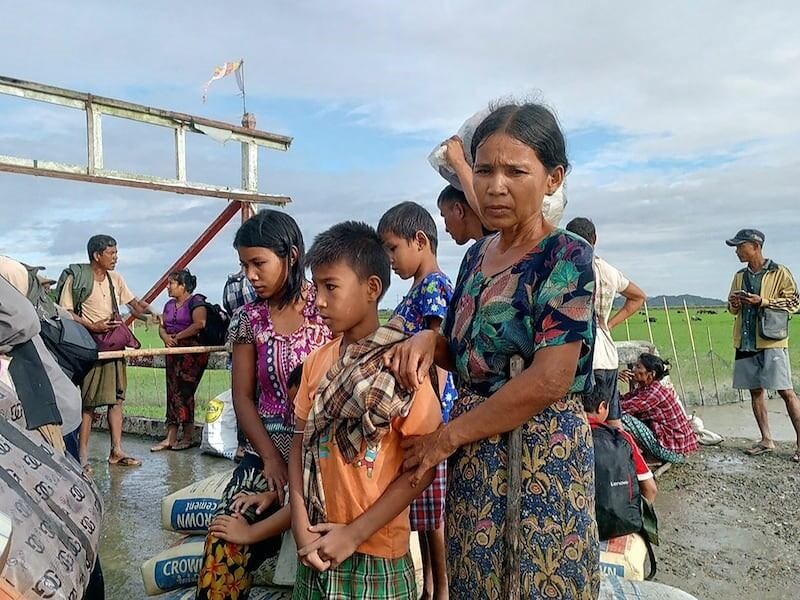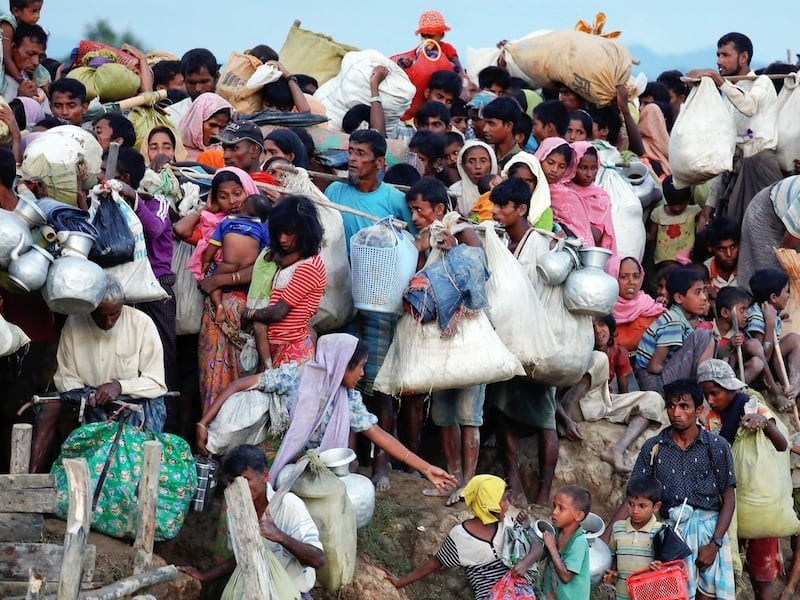The dream of returning home to Myanmar remains uncertain for hundreds of thousands of Rohingya who fled to Bangladesh despite rebel control of the border, members of the ethnic group said Friday.
About 800,000 Rohingya fled from western Myanmar’s Rakhine state following a bloody crackdown against members of their stateless Muslim minority group in August 2017.
They joined other Rohingya who had settled in camps in and around Cox’s Bazar, bringing the total number of refugees in southeastern Bangladesh at the time to over 1 million.
Years of negotiations to repatriate Rohingyas to Rakhine state have yielded little progress, in part because members of the community say their safety cannot be guaranteed back home after the military that targeted them seized power in a February 2021 coup d’etat.
On Dec. 8, rebels known as the Arakan Army (AA), which is battling the junta for self-determination in Rakhine state, captured Maungdaw township and took control of the region's border with Bangladesh.
The takeover rekindled hope that the Rohingya might be offered safe transport across the border and feel comfortable enough with AA governance to resettle their communities in Rakhine.
On Wednesday, the AA – which controls about 80% of Rakhine state – announced that it would begin allowing people displaced by fighting to return home, after having fully secured the border.
RELATED STORIES
[ Almost 65,000 Rohingya have entered Bangladesh since late 2023, govt saysOpens in new window ]
[ Rebels in Myanmar’s Rakhine state seize another stronghold, shun talksOpens in new window ]
[ Myanmar’s Rohingya suffer amid fightingOpens in new window ]
However, RFA Burmese, a news service affiliated with BenarNews, spoke with Rohingya in Bangladesh who said they remain uncertain about their return – in part because it’s unclear whether the AA might accommodate such a move and because ongoing fighting in Rakhine would leave them susceptible to military airstrikes.
“It is a time of war, so it is impossible for us to return home,” said Mohammed, a Rohingya from Kutupalong refugee camp in Bangladesh. “Even if the AA takes over the entirety Rakhine state, our repatriation program remains far off because they are not a legitimate government.”
Rohingya who earlier fled violence and persecution in Myanmar said they had been kidnapped and forced to fight in the country's ongoing civil war for the Arakan Army as well as the junta.
Nearly 65,000 Rohingya have crossed into southeastern Bangladesh since late 2023 amid unrest and violence in Rakhine, according to Bangladeshi officials.
Even if the refugees are allowed to return home, they remain fearful of junta airstrikes, said Europe-based Rohingya activist Nay San Lwin.
“The repatriation program is directly related to the AA because they currently control the area [where the Rohingya communities are],” he said. “Even if the AA gives firm guarantees, the Rohingya people might suffer great losses if the junta carry out airstrikes when they return home. Their repatriation is largely concerned with their security.”
Demands for recognition
Rohingya have also demanded recognition of their identity as an ethnic minority of Myanmar, acknowledgment of their Myanmar citizenship and the opportunity to return home “with dignity.”
On Dec. 25, more than 100,000 Rohingya in the Cox’s Bazar refugee camps protested and called for assistance from the international community, including the United Nations, in meeting their demands ahead of a return to Myanmar.
“When people in the camps return home, they hope to go back to their original homes,” said Mohammed of the Kutupalong refugee camp. “Moreover, we have also asked both Myanmar and international representatives to ensure our rights to freedom of movement, access to education, and all other basic rights. We will not change these demands.”
The AA’s seizure of the border has, in some ways, complicated the issue even further.

On Dec. 22, during a meeting on the situation in Myanmar, held in Thailand last month, Bangladesh Foreign Ministry spokesman Mohammad Rafi Alam told reporters that the Bangladesh government had urged Myanmar’s junta to “find a way” to settle the border dispute as it would “not engage” with the AA.
A week later, however, Bangladesh security analysts, former diplomats and scholars advised the Bangladesh government to engage with the AA directly and diplomatically. The status of the relationship remains uncertain.
A former district law officer who asked not to be named because of security concerns told RFA that the repatriation of the Rohingya will depend on the ruling administration in Rakhine state.
“Since there is currently no legal framework for the repatriation of the Rohingya, a bilateral agreement is essential for implementing this program,” he said.
On Dec. 23, nearly 30 Rohingya organizations worldwide called on the AA to guarantee the rights and security of all communities in Rakhine state, including the Rohingya; establish an interim consultative committee; recognize the Rohingya as an ethnic minority of Myanmar; and adopt and enforce a public code of conduct for AA fighters.
Attempts by RFA to contact AA spokesperson Khaing Thukha for comment on the Rohingya return went unanswered by the time of publishing.
Dire food shortage
Meanwhile, more than 5,000 displaced Rohingya sheltering at a camp in Rakhine’s Pauktaw township are in urgent need of food after not receiving aid for over a year, they told RFA on Friday.
A Rohingya at the camp in Pauktaw’s Ah Nauk Ye village said that the displaced are living on a diet of rice gruel.
“[Dry] rice is urgently needed at the camp as some displaced persons are suffering from starvation,” said the camp resident, speaking on condition of anonymity because of fear of reprisal. “We have no jobs and are forced to borrow money from others. The rising prices of essential goods are making our situation even more difficult.”
Camp residents said that a pregnant woman, an elderly person, and a child died in December over a lack of access to health care and medicine, as well as malnutrition.

According to the United Nations Office for the Coordination of Humanitarian Affairs, Myanmar’s junta has restricted the delivery of food, medicine and other relief items under its humanitarian assistance program to Rakhine state.
Moreover, local and international aid agencies have been blocked and the United Nations Development Program warned in November that about 2 million people in Rakhine state could experience food shortage in March and April.
Attempts by RFA to reach Hla Thein, the attorney general and junta spokesperson for Rakhine state, for comment went unanswered Friday.
